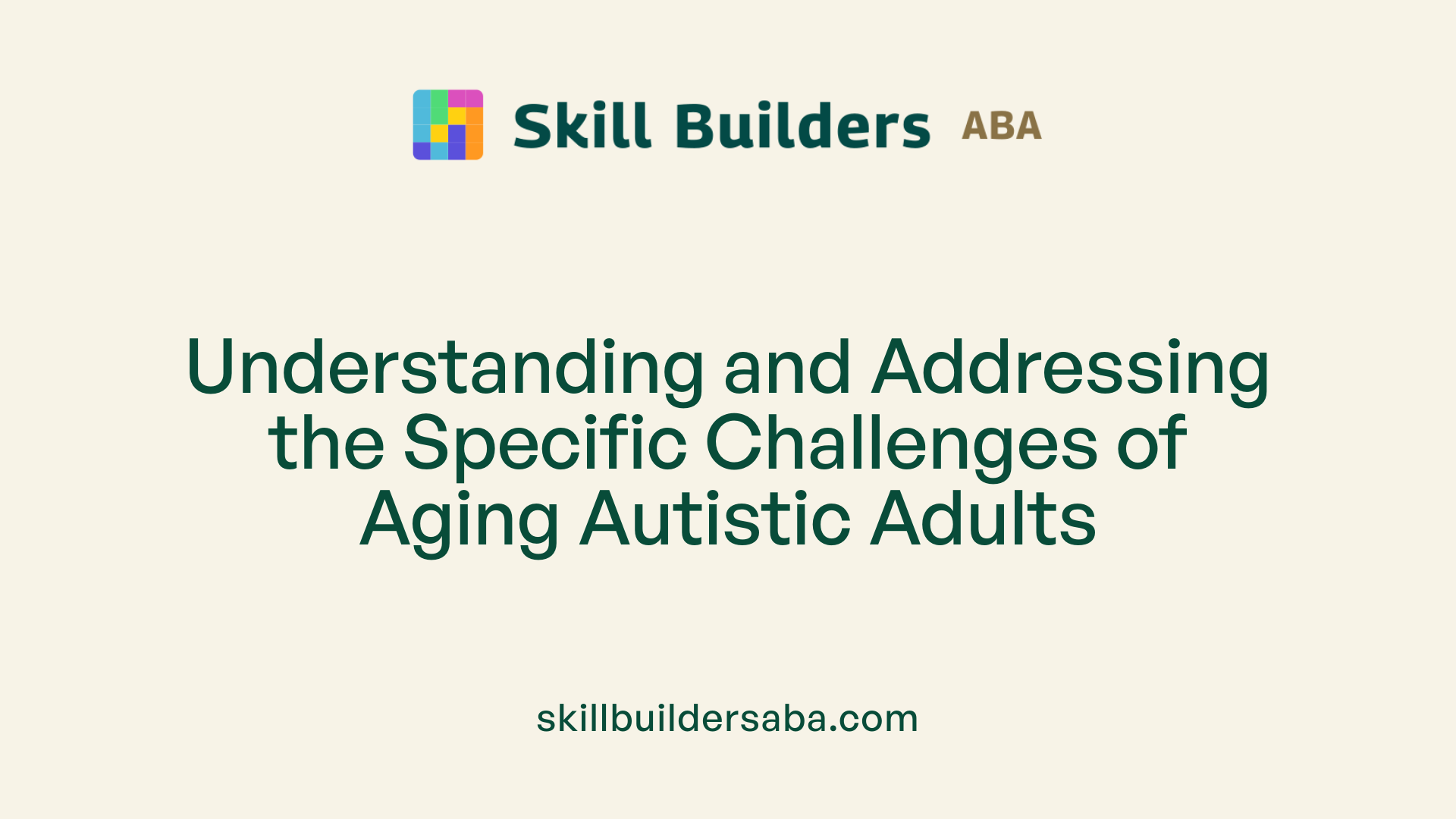
Can Elderly People With Autism Need Home Care?
Understanding the Necessity of Home Care for Aging Adults With Autism
Silent Challenges in Later Life: Autism and Aging
As the population of older adults with autism grows, recognizing their unique needs becomes critical. Many may have been undiagnosed in earlier years due to limited understanding of autism spectrum disorder (ASD). Aging introduces additional health and social challenges that require specialized attention, often best provided through tailored home care support.
Unique Needs of Elderly Individuals With Autism

What are the specific needs of elderly individuals with autism?
Elderly adults with autism face a distinct set of challenges that evolve with age. Their needs stem from lifelong neurodevelopmental differences combined with typical age-related health changes. Many experience higher incidences of physical health issues, such as gastrointestinal problems, neurological disorders like epilepsy or Parkinson’s disease, sleep disturbances, and cardiovascular conditions. These health concerns demand specialized medical attention and regular monitoring.
Mental health is another critical area. Anxiety, depression, and thoughts of suicidality are common and often intensified by feelings of social isolation, loneliness, or reduced social engagement. Supportive social networks and mental health resources are vital in enhancing their quality of life.
Effective healthcare for older autistic adults includes tailored approaches that respect communication difficulties and sensory sensitivities. This involves person-centered care plans, clear and precise language, and sensory-friendly environments that accommodate sensitivities to noise, light, or touch.
Research and policy gaps are evident, with limited knowledge about optimal practices for supporting aging autistic populations. Issues like housing, end-of-life planning, and access to appropriate health and social services are areas requiring urgent attention. Developing community-based programs and healthcare strategies that recognize their unique needs can foster more inclusive and supportive living conditions.
Addressing these complex needs involves a collaborative approach among healthcare providers, caregivers, policymakers, and community services, aimed at promoting independence, well-being, and dignity in later life.
| Aspect | Challenges | Support Strategies |
|---|---|---|
| Physical health | Gastrointestinal, neurological, cardiovascular issues | Regular health check-ups, specialized medical care |
| Mental health | Anxiety, depression, social isolation | Mental health services, social engagement programs |
| Communication | Difficulties worsening with age | Use of communication aids, tailored support strategies |
| Sensory sensitivities | Noise, lights, textures | Sensory-friendly environments, calming tools |
| Social participation | Reduced social interactions | Structured activities, support groups |
Understanding and responding to these specific needs are essential steps toward improving their overall quality of life and ensuring they receive the respect and dignity they deserve as they age.
Effective Home Care Practices for Seniors With Autism

What are the best practices for caring for seniors with autism?
Providing optimal care for elderly individuals with autism involves several thoughtful strategies. Central to these are personalized care plans that are tailored to the individual's specific needs, preferences, and behavioral patterns.
Creating a sensory-friendly environment can significantly reduce overstimulation. This may include using noise-canceling headphones, adjusting lighting to softer tones, and providing comfortable, tactilely pleasing furnishings.
Establishing and maintaining consistent routines helps provide stability and predictability, which many seniors with autism find comforting. Regular schedules for daily activities, meals, and sleep can minimize anxiety.
Effective communication is crucial. Simplifying language, using clear and direct instructions, and incorporating visual aids or assistive technology support understanding and reduce frustration.
Collaboration with healthcare professionals who understand autism in older adults is essential. This team can offer guidance on managing co-occurring conditions, behavioral challenges, and other health concerns.
Implementing these practices requires patience and empathy but can lead to a more supportive and enriching environment for seniors living with autism.
Supporting Elderly Adults With Autism at Home

How can home care providers best support elderly people with autism?
Supporting older adults with autism requires a personalized and comprehensive approach. Caregivers should craft a safe, welcoming environment that responds to both physical and sensory sensitivities. This involves making adjustments such as noise-reducing tools, sensory-friendly lighting, and avoiding overstimulating stimuli.
Creating structured routines offers predictability, which can be calming and help reduce anxiety. These routines should focus on daily activities like meal times, exercise, and social interactions, which promote independence and stability.
Staff training is essential to meet the specific needs of autistic seniors. Caregivers should be educated on behavioral techniques, like behavior skills training (BST), and aging-related considerations, including mobility support and communication barriers.
A collaborative approach can improve outcomes. Working with healthcare professionals—such as occupational therapists, speech therapists, and medical practitioners—ensures that the care plan adapts to health changes over time.
Utilizing community resources like respite services, support groups, and programs tailored for autistic seniors enhances overall well-being. Family involvement remains crucial for personalized, compassionate care.
In summary, the best practices combine environment adaptation, routine promotion, staff training, behavioral strategies, and community support to enable older adults with autism to live comfortably, safely, and with dignity.
Challenges and Sensitivities in Autism and Aging

What are some challenges and sensitivities related to autism and aging?
Older adults with autism face numerous challenges that stem from both aging and autism-related differences. They are often more susceptible to co-occurring health conditions, including gastrointestinal issues, sleep disturbances, metabolic and cardiovascular disorders, and neurological conditions such as early-onset dementia or parkinsonism.
Research indicates that these individuals may experience health problems at a faster rate, with increased risks of mortality around 20 years earlier than the general population. Mental health issues, notably anxiety and depression, are also common and can exacerbate overall wellbeing.
Social participation is often limited due to difficulties with social interactions and communication, which can lead to feelings of loneliness and social isolation. This reduced social engagement can adversely affect both mental and physical health. Additionally, physical activity levels are usually lower, further impacting overall health.
Sensory sensitivities—such as heightened reactions to noise, light, or touch—may persist or even intensify with age. Properly understanding individual health triggers and providing sensory-friendly environments are crucial for supporting aging adults with autism.
Providing tailored care involves accommodating these sensitivities and health challenges. This includes creating age-appropriate support strategies, fostering social connections, and ensuring access to specialized healthcare services that recognize the unique needs of autistic seniors.
Overall, addressing these compounded challenges requires a comprehensive approach to healthcare and social support, aiming to improve quality of life, independence, and wellbeing for aging individuals with autism.
Medical and Support Services for Elderly Autistic Adults

What medical considerations are important for elderly individuals with autism?
Elderly adults living with autism face specific medical challenges that require tailored attention. Common health concerns include managing comorbidities such as gastrointestinal issues, seizure disorders, mental health conditions, osteoporosis, and cardiovascular problems. These health issues are prevalent among aging autistic populations and need proactive management.
Sensory sensitivities and communication struggles often persist or even intensify with age. Creating sensory-friendly environments—using tools like noise-canceling headphones, sunglasses, and relaxation techniques—can help reduce sensory overload and make healthcare visits more manageable. Personalized care plans, supported by tools like the Autism Healthcare Accommodations Tool (AHAT), ensure healthcare providers can tailor treatments to individual needs.
Monitoring medication use is also crucial. Polypharmacy and potential drug interactions pose risks, especially with psychotropic medications. Thus, careful medication management and regular assessments are essential.
Preventive strategies focus on fall prevention, maintaining healthy bone density, and screening for neurodegenerative diseases such as dementia. Managing chronic conditions effectively through regular health checks and involving family or caregivers in planning ensures continuity and support.
To accommodate these needs, healthcare providers should adapt appointment settings, possibly offering longer visits and involving caregivers in treatment discussions. This comprehensive and individualized approach aims to address the complexities faced by older autistic adults, promoting health and well-being.
What support services are available for elderly individuals with autism?
Support services for aging adults with autism span a broad spectrum of community and healthcare options. Specialized adult autism services provide ongoing assessment and tailored interventions. Residential communities equipped with trained staff offer safe housing options that support independence while addressing safety needs.
Healthcare support is provided by professionals including speech-language pathologists, behavior analysts, and psychiatrists familiar with autism in older populations. These services help address communication challenges, behavioral concerns, and mental health issues.
Community programs and social groups are vital for reducing isolation. Many organizations facilitate social engagement through structured activities, support groups, and online platforms tailored for seniors with autism.
Housing resources are available to meet physical and safety needs, such as programs like the Section 811 Supportive Housing. These options are adaptable to changing needs over time.
Effective support involves continuous assessment and individualized planning. Training staff and caregivers to understand autism in older adults ensures that care is respectful, effective, and responsive to diverse needs.
| Support Service Type | Examples | Additional Notes |
|---|---|---|
| Healthcare Providers | Speech therapists, psychiatrists | Specialized knowledge essential |
| Residential Homes | Supported living communities | Adapted to safety and independence |
| Community Programs | Social groups, online forums | Reduce loneliness and promote social skills |
| Housing Support | Section 811 Supportive Housing | Financial aid options available |
Providing these specialized services can significantly enhance quality of life for elderly individuals on the spectrum, ensuring they receive compassionate, personalized care as they age.
Moving Towards Inclusive, Supportive Care for Aging Autistic Adults
As the demand for appropriate care for aging adults with autism increases, understanding their unique needs and implementing effective home care strategies becomes crucial. Providing tailored support that emphasizes routine, sensory sensitivities, medical management, and social engagement can significantly enhance their quality of life. Investments in specialized services, caregiver training, and community resources are vital in building a truly inclusive system where autistic seniors can age with dignity, independence, and happiness.
References
- Caring for Older People with Autism - CareHop
- Understanding Autism In Older Adults - Parx Home Health Care
- How can we improve residential care for older autistic adults?
- 12 Tips for Caring for Seniors with Autism - ConsidraCare
- How Home Care Can Help People with Autism
- Resources for autistic adults | Autism Speaks
- Supporting Older Adults with Autism - Autism Spectrum News
- Finding your community | Autism Speaks
- Housing Resources for Autism - Websites and Program | IACC
- Autism in Older Adults: Challenges, Treatment, and Support
Get Answers and Explore Your Options
Take a moment to browse our site to get a sense of our services and approach. If you’d prefer a direct conversation about next steps, you’re welcome to get in touch with a care coordinator.
.svg)